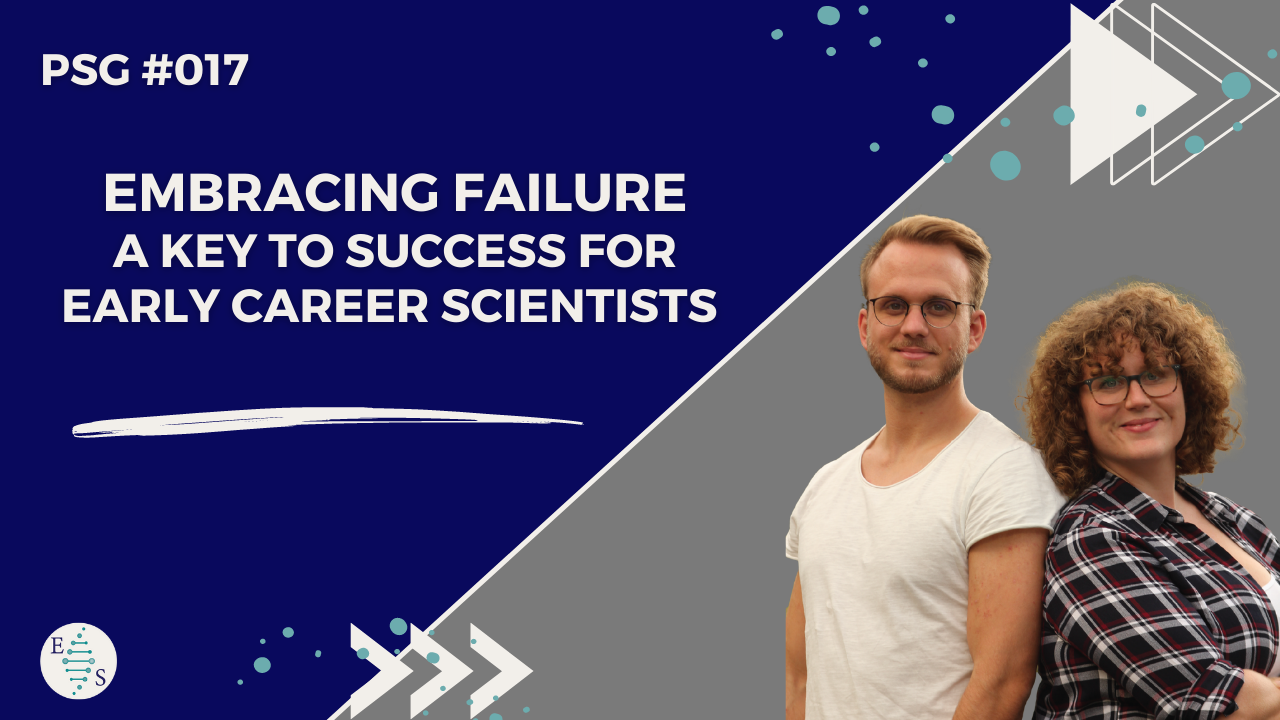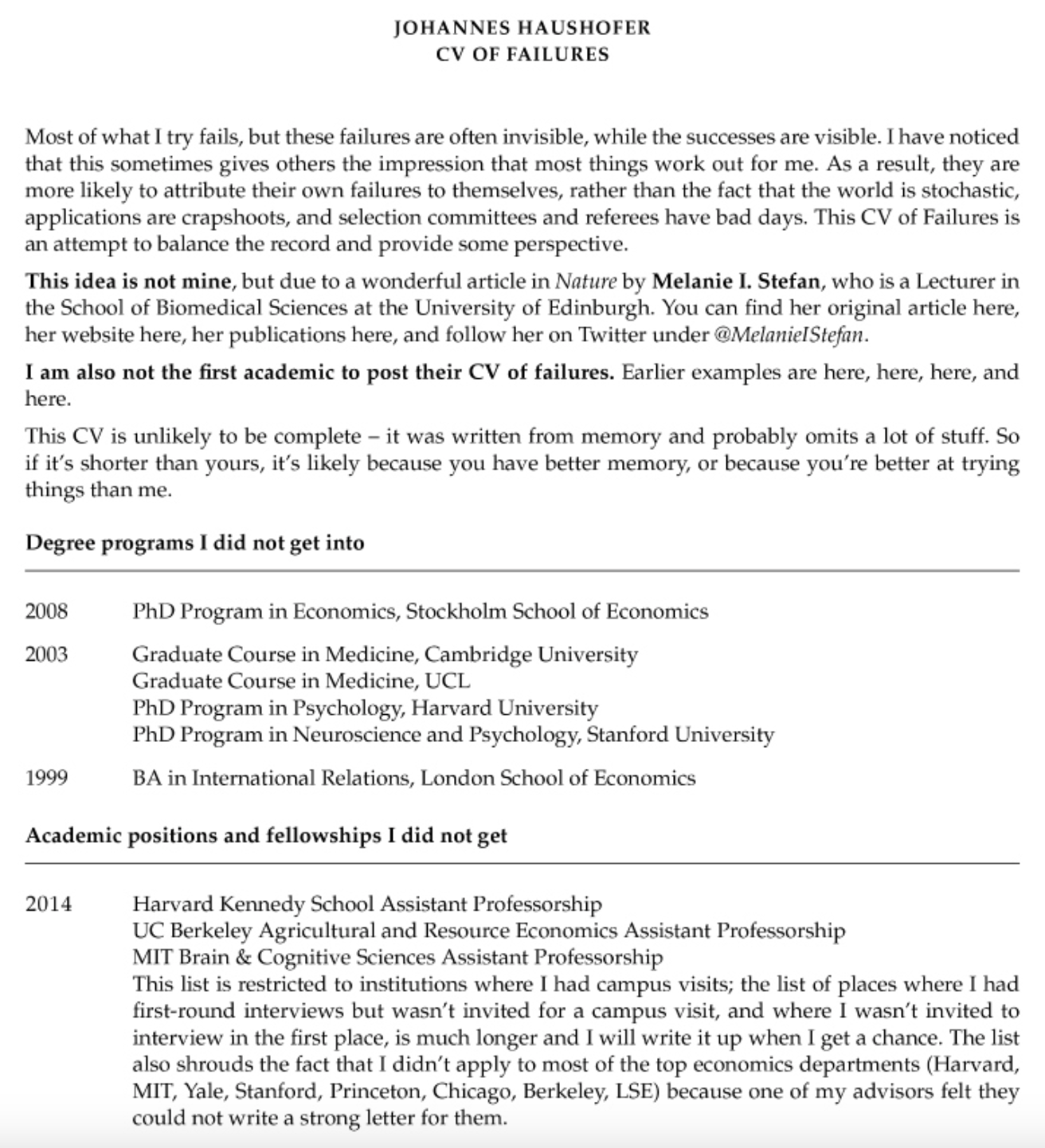
PSG #017: Embracing failure - a key to success for early career scientists
Aug 20, 2023Hey there fellow early-career scientists! Have you ever felt discouraged by a failed experiment or grant application? Well, we’re here to tell you that failure isn't the end of the road. In fact, it can be the key to unlocking success.
So let's embrace failure and use it as a stepping stone towards achieving our goals!
1. Why Early-Career Scientists Should Welcome Failure
As an early-career scientist, it's easy to feel like failure is the end of the world. But the truth is, failure is actually a necessary step to success. When you welcome failure, you open yourself up to new opportunities for growth and learning.
Instead of feeling defeated, you can use your failures as a chance to reflect on what went wrong and what you can alter next time. Embracing failure also allows you to take more risks and be more innovative in your work. With the right mindset, your chances are high that you can avoid „this mistake“ next time.
So the more you fail the less you fail in the long run.
When you're not afraid to fail, you're more likely to try new things and push boundaries. Of course, failure can still be difficult to deal with.
But by learning from your mistakes and utilizing all resources, you can bash all challenges. Especially as an early career scientist!
So don't be afraid to fail – embrace it as an essential part of your journey to success.
2. Advantages of Embracing Failure for Early-Career Scientists
Embracing failure is a necessary step to success for early-career scientists. As intimidating as it may seem, failure can actually have several advantages.
- First, it can help you learn from your mistakes and improve your skills. By analyzing what went wrong, you can identify areas for improvement and develop new strategies for success.
- Second, failure can build resilience and perseverance. PhDs face many challenges, and failure can help you develop the mental toughness needed to overcome them.
- Third, failure can lead to unexpected opportunities. Sometimes, the biggest breakthroughs come from unexpected failures.
The idea of embracing failure has grown in academia over the last few years. One trend was to publish a CV of failures.
Professors share which grants, publications, and jobs they did not achieve. Like for example:
Every scientist I know experienced failure. I for example got turned down for scholarships, jobs, workshops, and publications...
I failed like a million experiments in the lab … but in the end, I got my degree!
By embracing failure, you open yourself up to new possibilities and discoveries. Learning from and growing through failure is not easy, but it is essential for success.
With the help of mentors and peer networks, you can conquer the difficulties of early-career science and come out even stronger.
Remember, failure is not the end, but rather a necessary step on the path to success.
4. Tips for Learning From and Growing Through Failure
Failure is an inevitable part of life, and it's especially true for early-career scientists.
I can’t count the times a failed at experiments, especially in the beginning, but also later in my PhD journey. I was very frustrated, disappointed, ashamed and even angry at myself for failing all the time. I did not want to talk about my failed experiments in our group meeting or with my boss because I did not want to look stupid. I thought about giving up. Afraid to fail yet another time.
Until I learned that instead of fearing failure, you need to embrace it as a necessary step towards success.
But how can we learn from and grow through failure?
Here are some tips to help you navigate through the challenges of early-career science.
- First, don't be too hard on yourself. Failure is not a reflection of your abilities, but rather an opportunity to learn and improve.
- Second, take the time to reflect on what went wrong and what you could have done differently. This will help you identify areas for improvement and prevent future mistakes.
- Third, seek feedback from others, especially from those who have more experience. They can provide valuable insights and perspectives that you may have missed.
- Last, don't be afraid to try again. Failure is not the end, but rather a chance to try again with a new approach. The time you need to recover from failure will shorten the more you fail
All these are easier said than done and it took me a while to wrap my head around them.
But when I implemented them it made my life easier and my progress faster. For example, Showing failed experiments in your group meeting helps you to get feedback, tips and new idea to try out.
Others might have experienced similar failures and can offer help, tips and support!
To achieve success, early-career scientists need to learn from failure, develop resilience, and persevere.
5. Utilizing Resources to Help You Navigate the Challenges of Early-Career Science
Navigating the challenges of early-career science can be daunting, but there are resources available to help you along the way.
- One such resource is your network of colleagues and mentors. Don't be afraid to reach out to them for advice or guidance when facing a difficult situation. They might have experienced some similar before and might be able to support you with tips, tricks or just understanding.
- Additionally, Conferences and workshops give you the chance to learn new skills and connect with others in your field.
- Another important resource is your own personal drive and determination. By embracing failure and using it as a tool for growth, you can develop resilience and perseverance. These are crucial for success in the field of science.
By doing so, you can navigate all challenges of early-career scientists with confidence and achieve success.
6. Conclusion: Accepting and Learning From Failure is an essential part of success for early-career scientists
In conclusion, early-career scientists must embrace and learn from failure. It may seem counterintuitive, but failure is necessary for growth and progress. By doing so, scientists can gain valuable lessons, experience, and resilience, ultimately achieving success.
But, it's important to remember that failure is not the end. Rather, it's an opportunity to learn, grow, and try again. To make the most of failure, PhDs should reflect on their mistakes, seek feedback, and use available resources. With the right mindset and approach, failure can be a powerful tool for success in the world of science.
So, don't be afraid to take risks, make mistakes, and learn from failure. Embrace it as a necessary step towards achieving your goals and making meaningful contributions to your field.
See you next week!
PhD survival guide is a free newsletter. Please support by sharing with those who may benefit from this post.
If you want more help:
We're excited to share the PhD Survival System with you because we know how tough it can be to get through a PhD program. We have developed a holistic system combining all the necessary areas to obtain optimal results.
We start with the foundation, your mindset and on top of that we building two pillars with time management and stress management
More about the PhD Survival System here:
Stay connected!
Join our newsletter to receive the latest posts!
Don't worry, your information will not be shared.
We hate SPAM. We will never sell your information, for any reason.
